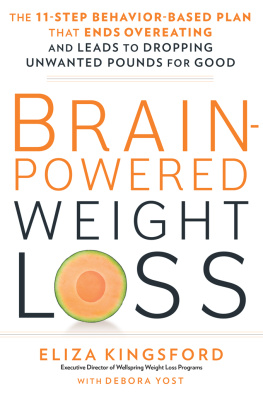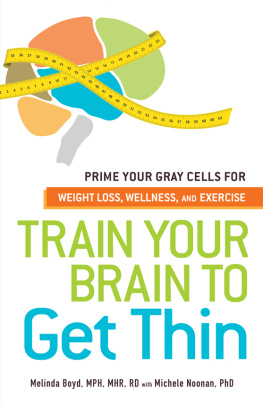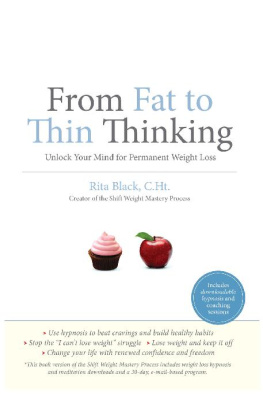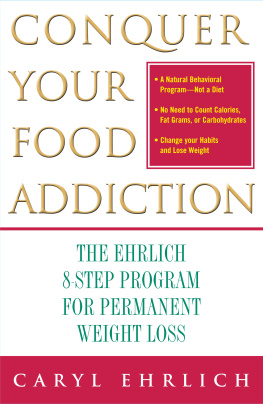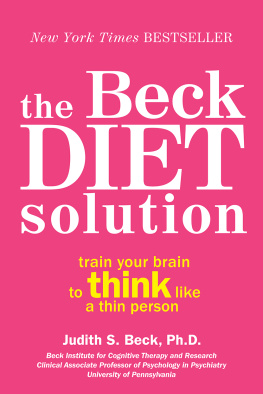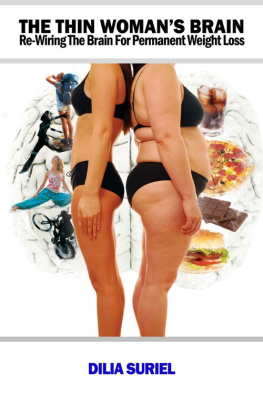
To Tom, who is always pushing me to do and be my best.
To all of the Wellspring families weve served over the years, your courage is inspiring. I hope this offers you some wisdom and support on your journey.

CONTENTS
FOREWORD
Food, Behavior, Addiction, and Overweight
I have worked for more than 40 years trying to understand how food, sugar, and drugs of abuse hijack the brain, insinuate themselves into the users thoughts, stimulate their own taking, and cause addictions. During this time, neuroscientists have made great progress in understanding where each drug of abuse goes in the brain and body and the changes that occur during intoxication and withdrawal. We can now pinpoint where in the brain the effects are taking place. This has opened new horizons, enabling us to approach the treatment of obesity in promising new ways.
A lot of progress has been made in our understanding of obesity since the days when we began to focus on the conditions associated with obesity, such as diabetes, heart disease, kidney disease, cancer, and joint problems, like we focused on the emphysema, bronchitis, cancers, and osteoporosis associated with smoking. We now have a new understanding for how bariatric surgery and pharmacological treatments work, and have seen the approval of new medications for obesity based on the addictive nature of certain foods. Still, these treatments are not cures, are incomplete, and work best in the context of a life-changing program. Putting research into clinical practice is quite complicated and is always a work in progress. It requires that someone take a concept or concepts, weave them into the matrix of a caring program, test outcomes, and adjustwhile still helping to move the field forward.
I consider Eliza Kingsford a national leader in weight management. The reason: What the rest of us have discovered in academia, laboratory, and clinical settings, this pioneer has actually put into practice. The culmination of all her knowledge and successful hands-on experience in helping people find the solution to their weight-loss issues is the book you have in your hands.
Kingsford, a licensed psychotherapist, is the leader of Wellspring, the largest, oldest, and most-respected noninstitutional weight-loss program in the world. What she has achieved in her 10-year tenure, including two years as executive director, is nothing short of extraordinary. Rarely is an expert so grounded in science and the actual delivery of overweight and obesity treatment. Kingsford has learned by working with national and international experts, listening, and applying these insights in an open-air camp setting. She has worked with thousands of young people who have serious issues with food, including the stigma, shame, and trauma that often are part of it all. She knows and studies the literature and applies it in the field, ferreting out what doesnt work (or doesnt work very well), and polishing and improving what benefits people and helps them come to terms with their own food addictions and behaviors that drive their urge to overeat.
I have worked to understand food-brain reward and its relationship to drugs of abuse and addictions since the early 1980s. I am lucky to have worked with leading obesity and food addiction experts: the late Bart Hoebel, PhD, formerly of Princeton University; and Kelly D. Brownell, PhD, of Duke University and formerly of Yale; as well as other top food and addiction experts, including Nicole Avena, PhD; Ashley Gearhardt, PhD; Samuel Klein, MD; Louis J. Aronne, MD; Robert H. Lustig, MD; Gene-Jack Wang, MD; and Marc N. Potenza, MD. Yes, we have really found that, for many people, eating is an addiction as powerful as cigarettes, recreational drugs, gambling, and sex.
Failed diets and attempts to control overeating, preoccupation with food and eating, and the shame, anger, and guilt that follow look and respond like traditional addictions. It is common for people to overeat beyond fullness for the same brain reward that drives people to smoke, take recreation drugs, gamble, and engage in unhealthy sexual practices. These experts and I have been instrumental in helping Kingsford translate and advance our laboratory science into Wellsprings treatment program and the first-of-its kind do-it-yourself plan she created called Brain-Powered Weight Loss. Just as we use behavioral therapies to overcome these addictions, Kingsford uses the same and similar therapies to help people overcome the grip that food has on their day-to-day lives. Its the link that is missing from all other weight-related programs.
Eliza Kingsford gets it. She understands that the reason overweight and obese people behave in unhealthy ways around food, in spite of the potentially devastating consequences, is because they have a dysfunctional relationship with food. This is the reason why achieving permanent weight loss is so difficult. She also knows that it is possible to address the trauma, shame, stigma, and the effects of food, especially highly palatable food, on the brain. The most novel part of her plan is the tools she uses, which have little to do with what someone should or should not eat in order to lose weight. Her tools are all powered by the brainself-implementing techniques, based on proven cognitive therapies, that help people change the way they think and behave around food.
What is more striking and impresses me the most about her successful approach is her goal to steer people toward better physical and mental health, balance, well-being, and wellness. I believe in her programit will evolve as science and evidence change. It offers the most promise to people who are trying to overcome their struggle with overweight and obesity on their own.
Kingsford brings an innovative and unique approach to achieving long-term weight-loss success in a way thats almost unheard of: by teaching overeaters how to change long-ingrained habits that drive an unhealthy relationship with food. Once you read this book, youll find, as others have, that it is possible to calmly and assuredly be in control of your relationship with food instead of the other way around.
Mark S. Gold, MD
17th Distinguished Alumni Professor, University of Florida;
Adjunct Professor of Psychiatry, Washington University, St. Louis;
Chair, Scientific Advisory Boards for RiverMend Health, a national provider of addiction, eating disorders, and obesity evaluation and treatment
WHY I WROTE THIS BOOK
F or more than a decade, I have been helping people overcome their weight-loss issues. They usually end up in my office unhappy with their relationship with food and their bodies, and are ready to make a change.
What Ive observed on a regular basis is a problem at the intersection of theory and practice. By that I mean people are buoyed when the newest diet book (theory) comes out, only to find themselves disappointed in the eventual outcome (practice). They know what they should do, what the latest science suggests, and what the latest research supports, yet they struggle with why they cant seem to make it work.
Ive found that the key to success must involve both theory and practice. There is a need for both. We need to know what the science of weight loss is teaching us, but more so, we need to understand human behavior. Somehow, after reading all the latest diet booksmany written by incredibly knowledgeable and talented doctors and scientistspeople lose weight, only to go back to engaging in the same behaviors they had before the diet began. You know where that leads!

